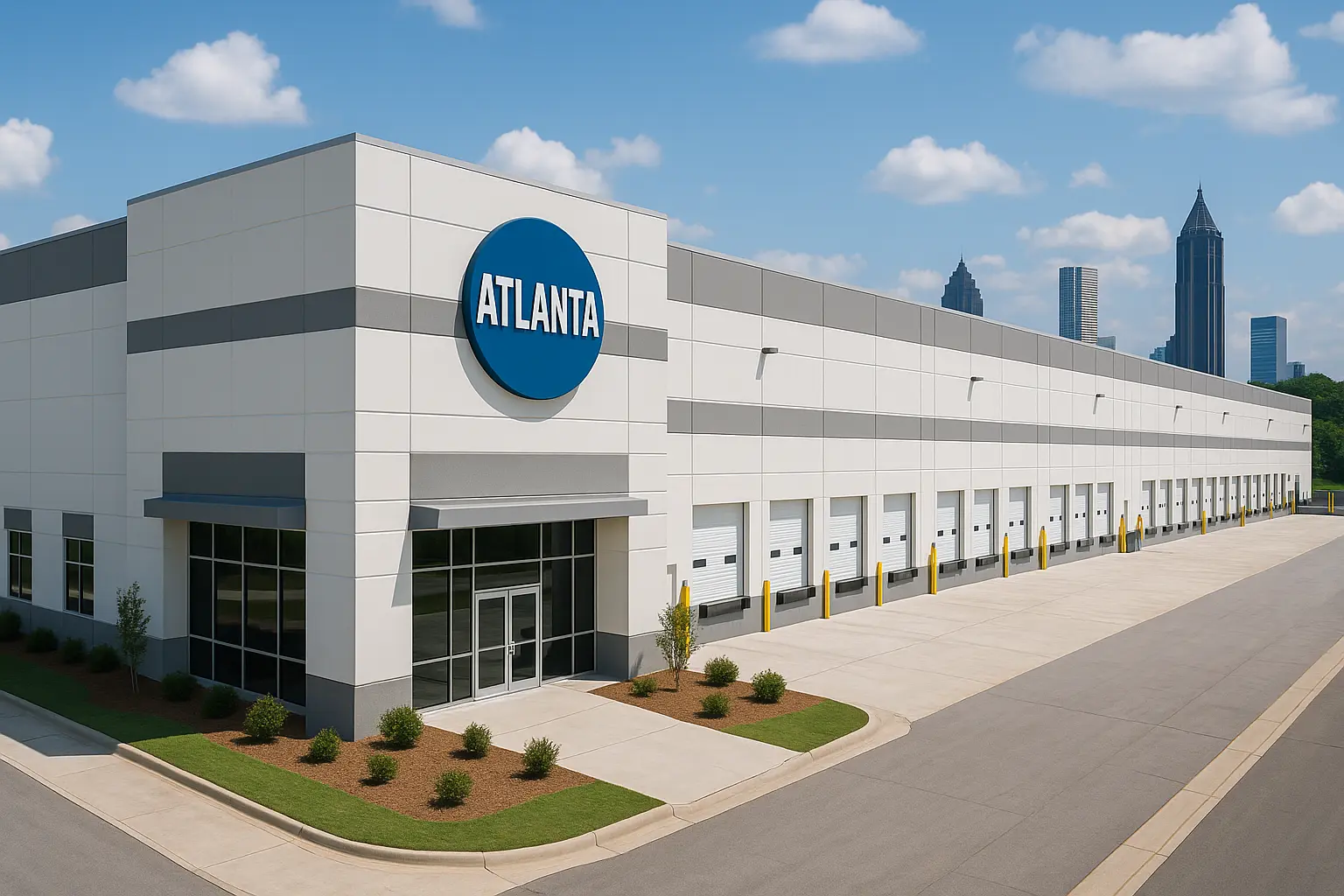Atlanta Ecommerce Fulfillment: What You Need to Know Before Choosing a 3PL
Atlanta ecommerce fulfillment has become a major competitive advantage for growing DTC brands, subscription-box companies, and retail marketers who need fast, accurate, same-to-next-day shipping across the U.S. If you’re evaluating 3PL partners, location matters, workflow discipline matters, and understanding what actually happens inside a fulfillment center matters even more.
This guide walks you through how Atlanta-based ecommerce fulfillment works, when it’s the right time to outsource, what pricing looks like, and what risks to watch for—so you can request quotes with confidence and set the right expectations.
.webp)
What Atlanta Ecommerce Fulfillment Actually Means
Atlanta ecommerce fulfillment refers to storing, picking, packing, and shipping online orders from a 3PL located in the Atlanta metro area. What makes Atlanta uniquely valuable is geography: it sits within a two-day ground transit radius of roughly 80% of U.S. households. That means brands can offer fast delivery speeds without relying on costly air freight or extreme zoning penalties.
Most brands turn to an Atlanta fulfillment partner when internal operations hit a ceiling—order volume surpasses internal labor capacity, SKU complexity increases, packaging gets more sophisticated, or customers expect faster delivery windows. In those moments, outsourcing isn’t just convenient—it’s essential for maintaining consistency, accuracy, and cost control.
Different Atlanta fulfillment centers specialize in different needs, including:
Traditional distribution centers
These handle pallet storage and wholesale replenishment but typically lack the speed or ecommerce-focused processes required for direct-to-consumer fulfillment.
Ecommerce-optimized centers
These are built specifically for DTC workflows, including bin storage, barcode-driven picking, scan-based packing, fast returns processing, and flexible carrier integrations.
Kitting and assembly facilities
Ideal for subscription boxes, influencer kits, multi-SKU bundles, promotional boxes, and curated packouts.
Value-add fulfillment providers
Some Atlanta 3PLs—including All Points—offer integrated printing, branded inserts, on-demand marketing collateral, and custom packaging support under one roof.
Knowing which type of center aligns with your ecommerce model helps you choose a 3PL that can actually scale with you—not one that simply ships boxes.

How Atlanta Ecommerce Fulfillment Works (Step-by-Step)
A great fulfillment operation follows strict Standard Operating Procedures (SOPs) to maintain speed, accuracy, and control. Here’s how inventory moves through a well-run Atlanta fulfillment center.
1. Receiving and Dock-to-Stock
Inventory arrives through scheduled dock appointments, where shipments are counted, inspected, scanned, and checked against ASNs or BOLs. Any overages, shortages, or damage (OS&D) is documented immediately with photos and timestamps.
Strong fulfillment partners aim for same-day or next-day dock-to-stock, because fast putaway keeps your ecommerce storefront accurate and reduces the risk of overselling.
2. Inventory Management and Accuracy
Once items are put away, inventory is managed through a warehouse management system (WMS). Slotting, replenishment, cycle counts, and ABC classification are all part of maintaining accuracy above 99%.
This matters because ecommerce moves fast. If inventory is off by even a small percentage, your storefront becomes unreliable and customer trust erodes.
3. Pick & Pack Operations
Orders feed into the WMS through direct integrations with Shopify, WooCommerce, Amazon, or retail portals. Pickers use barcode scanners to pull the right items, while packers assemble orders according to your brand guidelines—right-sized packaging, appropriate protection, marketing inserts, and carrier-specific labeling.
Wave or batch picking increases efficiency, especially during peak periods.
4. Custom Kitting and Assembly
Many Atlanta brands offer subscription boxes, multi-item bundles, influencer kits, or seasonal collections. A fulfillment partner with strong kitting processes ensures every component is assembled accurately and consistently.
Some 3PLs—including All Points—support both prebuilt kits and on-demand kitting, depending on SKU velocity and your promotional calendar.
5. Integrated Printing for Marketing Materials
High-growth brands often use custom inserts, QR cards, branded stickers, or variable-content pieces. When printing and fulfillment happen under one roof, you eliminate delays, reduce errors, and improve the unboxing experience.
6. Quality Control and Scan Verification
Before sealing a package, fulfillment teams verify SKUs, quantities, and order configurations. High-value orders or fragile items may include photo documentation or added QA steps.
7. Packaging, Labeling, and Retail Compliance
For retail or marketplace orders, a fulfillment center must follow routing guides, packaging requirements, carton labels, and EDI transactions (940, 945, 856, and others). Ecommerce orders follow a more flexible workflow but still require precision labeling to avoid carrier surcharges.
8. Same-Day or Next-Day Shipping from the Atlanta Hub
With multiple daily pickups from major carriers, orders processed in Atlanta reach most of the U.S. quickly using ground shipping. Late cutoff times enable same-day dispatch, supporting fast turnaround for customer orders without inflating freight budgets.
9. Returns Processing
Returns flow through inspection, disposition (restock, refurbish, quarantine, scrap), and system updates. Fast returns turnaround minimizes customer wait times and keeps sellable inventory circulating.
This entire workflow keeps your ecommerce operation running smoothly—even during peak seasons or rapid growth periods.
.webp)
What Drives Pricing for Atlanta Ecommerce Fulfillment
Pricing varies by 3PL, but most Atlanta ecommerce fulfillment quotes include similar components.
Storage Costs
Pricing depends on whether your inventory uses pallet, bin, or cubic-foot storage. Items that linger longer in storage cost more. Seasonal peaks also affect space requirements.
Pick & Pack Complexity
More SKUs per order, fragile items, custom instructions, and branded packaging all influence labor time. Subscription boxes or multi-SKU bundles add additional assembly effort.
Packaging and Printing
Custom packaging, QR cards, branded inserts, and on-demand print production add material and labor costs. When printing happens in-house, these costs are typically lower and more predictable.
Order Volume
Higher volumes reduce per-order processing costs. Peak surges may introduce temporary labor add-ons.
Kitting and Assembly
Each kit build has a per-unit fee. One-time setup fees cover SOP creation, QC instructions, and packout design.
Shipping
Shipping is a pass-through cost determined by weight, DIM, service level, and zone. Atlanta’s geographic location helps reduce these costs significantly by lowering average zone miles.
Integrations and Advanced Services
EDI setup, multi-channel integrations, or custom API connections may involve one-time onboarding fees.
For the most accurate quotes, bring 90 days of order data—including SKU demand, order composition, and shipping zones—to your 3PL conversations.

Risks to Watch for When Choosing an Atlanta 3PL
Every fulfillment operation carries risk. The goal is to partner with a 3PL that already has systems in place to prevent or quickly resolve issues.
Inventory Inaccuracy
If counts are off, orders fail. Look for a partner with strong cycle counts, disciplined dock-to-stock processes, barcode-driven workflows, and simple reconciliation procedures.
Delayed Shipments
Late cutoffs, staffing issues, or limited carrier access can slow down shipping. Atlanta’s extensive carrier network helps reduce this risk, but only if the 3PL manages it well.
Complex Kitting Challenges
Brands using multiple vendors for printing, assembly, and packouts often deal with timing mismatches. Choosing a partner with everything under one roof saves time and reduces defects.
Missed SLAs and Poor Visibility
A good 3PL should provide dashboards, exception reporting, and proactive communication—not silence until something breaks.
Integration and EDI Errors
Retail errors can lead to costly chargebacks. Your 3PL should have proven EDI workflows and sandbox testing.
Hidden Fees
Request transparent, line-item pricing and periodic cost-to-serve reviews to prevent surprises.
Proactive risk mitigation is a hallmark of a strong Atlanta fulfillment partner.
Why Atlanta Is One of the Best Locations for Ecommerce Fulfillment
Choosing a 3PL in Atlanta offers several advantages—operational, financial, and competitive.
1. Fast Delivery to Most of the Country
About 80% of U.S. households can be reached within two days using ground transportation. This speeds up delivery while cutting air freight costs.
2. Lower Shipping Costs
Shipping from the Southeast reduces average zone miles to both coasts and the Midwest, lowering your overall freight spend.
3. Strong Carrier Network
Atlanta is home to major parcel and LTL hubs. More carrier options mean more reliable pickups and fewer disruptions.
4. A Skilled Logistics Workforce
Decades of supply chain activity in Georgia have created a deep pool of experienced fulfillment labor, which directly improves accuracy and consistency.
5. All Points Is Based in Atlanta and Has Been Since 1995
With nearly 30 years of experience, All Points provides operator-grade execution, integrated kitting and printing, and a partnership-driven approach focused on reliability—not the lowest sticker price.

What You Get When You Partner with All Points
Working with All Points means tapping into a fully integrated fulfillment ecosystem designed for speed, accuracy, and brand experience.
Operator-Grade SOPs and Execution
Clear processes, strong SLAs, and a culture centered on quality ensure your orders ship accurately and on time—even during peak volume.
Custom Kitting and Print Production Under One Roof
Reduce handoffs and improve brand presentation with integrated assembly and on-demand marketing collateral.
Scalable Ecommerce Fulfillment
Same-day dock-to-stock, same-day shipping, and precise pick accuracy support fast-moving DTC brands and complex SKU mixes.
Transparent Reporting and KPI Visibility
You get SLA dashboards, performance summaries, and proactive issue management—not reactive fixes.
A Long-Term Partnership Approach
We prioritize communication, quality, and alignment with your goals. You’re not just renting space—you’re gaining an extension of your operations.
FAQ
Q1: What services are included in Atlanta ecommerce fulfillment?
Storage, pick & pack, kitting, assembly, printing, and shipping—all performed from an Atlanta facility optimized for speed and accuracy.
Q2: How fast can orders ship from Atlanta?
Up to 80% of the U.S. can be reached within two business days using ground shipping.
Q3: What affects pricing?
Storage requirements, pick complexity, kitting, packaging, printing, order volume, seasonality, shipping zones, and integrations.
Q4: How does All Points ensure accurate shipping?
We target 99.5%+ order accuracy, same-day dock-to-stock, and 98%+ on-time shipping, backed by transparent KPIs.
Q5: Can printing and marketing inserts be integrated?
Yes. On-demand printing allows you to add branded inserts without storing large quantities.
Conclusion
Discover how Atlanta ecommerce fulfillment boosts fast, accurate shipping with specialized 3PL services—offering cost efficiencies, custom kitting, integrated printing, and proven KPIs. Learn key workflows, pricing drivers, and risks to choose the right partner for scaling your DTC brand nationwide.




.webp)
.webp)
.webp)
.webp)
.webp)
.webp)

